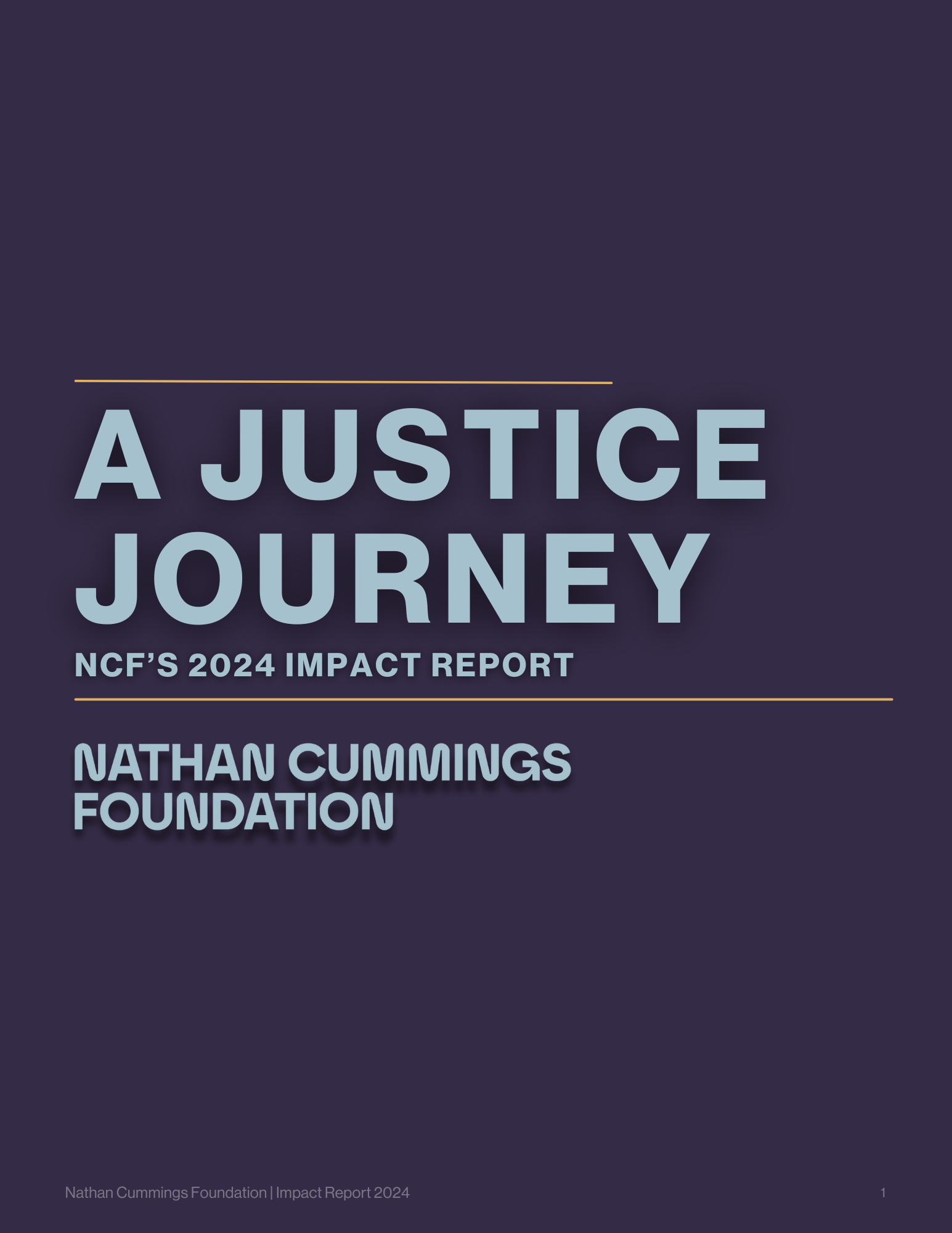Interview: Culture Change Leader Bridgit Antoinette Evans: A Conversation with NCF’s First Fourth-Generation Board Chair Jaimie Mayer
Executive Director of Pop Culture Collaborative and 2015 Nathan Cummings Foundation Fellow Bridgit Antoinette Evans sat down with our first fourth-generation Chair of the Board of Trustees Jaimie Mayer for a wide-ranging conversation about next generation leadership, building a culture of accountability in philanthropy and the power of narrative change. These are the edited excerpts from their talk.
I was so excited to hear the news. What does this mean for you and for NCF?
On a personal level, I’ve worked toward this for as long as I can remember. I’ve served on the board of NCF for 18 years, and have gained experience in the field running nonprofits and consulting next generation philanthropists. I was always inspired by my grandmother and my father’s leadership, so it’s especially meaningful to lead the foundation forward in their memory.
It’s also an important milestone because NCF is deeply committed to next generation leadership. I’m proud to say the fourth generation is more engaged now than ever. But it’s important to clarify that we’re an intergenerational foundation. And just because we have our first fourth-generation Chair doesn’t mean we won’t have another third-generation Chair. We believe there is great value in working shoulder to shoulder, with different generations learning from one another, as we grapple with what it means to be a social justice funder in the world today.
What do you hope other foundations, particularly multigenerational family foundations, take away from NCF’s commitment to next generation leadership?
I hope our actions motivate other family foundations to be champions for next generation leaders. If you don’t let the next generation in, then the legacy of the organization and its founder won’t have the same longevity, and by the same token, the work won’t evolve. Each generation has different passions, insights and views on the world. I can’t urge other foundations enough to let the next generation learn from those around the table, rather than thinking of it as passing the torch from generation to generation. The next generation shouldn’t be seen as threat; it should represent the future.
You’ve grown up with the foundation. How has this shaped your thinking and how you will bring this perspective to your role as chair?
I grew up around philanthropy and NCF. My great-grandfather Nathan Cummings passed away when I was two, and NCF was created posthumously, so there has never really been a time in my life that hasn’t involved the foundation in some way. I got to know my cousins through our involvement at the foundation. We’ve had a working relationship from the beginning, which has proven to be an invaluable asset. For the past 18 years, I have honed my skills, taking every opportunity to learn from family members, independent trustees and staff about how to best use our valuable resources to pursue justice for people and the planet. Having that type of a deep dive into the history and vision of the organization is rare and I’m excited to bring that to the table.
You have an extensive background in the arts, particularly in theater and film. How does your experience as a professional artist and arts leader translate into NCF’s investment in the intersection of arts and social justice?
As a theatre and film producer, I have spent my life and career firmly believing that culture change proceeds policy change, and in the power of arts and culture to shift societal narratives. After all, narratives play such a huge role in how we make sense of the world and how we make sense of each other. They shape the rules and guidelines of our society, dictating which problems are addressed and which solutions are on the table for consideration. And they expand our collective imagination of what is possible. NCF is a longstanding arts and social justice funder.
But through the years there’s been a shift in thinking on arts and culture as not only a vital piece of society, but also a vital strategy to change hearts and minds on the issues we’re advancing. We’re looking at how narrative shows up not only in our voice, creativity and culture portfolio but in all our focus areas as well as our shareholder activism work. While I find all the work at NCF critical at this moment in time, the through line of funding narrative change across our portfolios is particularly exciting to me.
At the Pop Culture Collaborative, we believe philanthropy has a responsibility to build a field that is capable of shaping popular culture to reflect the complexity of the American people and make a just and pluralistic future feel real, desirable and inevitable. A very ambitious set of goals, I will admit. How do you and NCF view the role of the pop culture field in seeding a new narrative environment?
For starters, we’re so proud to be a founding supporter of an organization like The Pop Culture Collaborative. The Collaborative’s formation is a critical leap forward in advancing the combined power of the entertainment, philanthropic and social justice sectors to use pop culture strategies to create transformative change. Plus, it’s a huge resource for philanthropy to better understand this space as a core strategic area for investment. It’s making way for things like cross-sector convenings and relationship-building, funder learning and partnerships, and the commissioning of new research and insights.
In terms of philanthropy’s role, there’s still a big shift that needs to happen in its understanding of culture as a strategy to advance our values. I view the arts as a process, not as a one-and-done product. That means its impact takes time – and can be challenging to measure. Philanthropy needs to be willing to invest in long-term narrative building and increase its risk appetite for this type of funding. If you’re not comfortable going into unchartered territory that doesn’t have all the metrics and measurements of success packaged and tied with a pretty bow, then you’re certainly not going to move the needle. And that’s one of the things I’m most proud of NCF for consistently doing.
If you could wave a magic wand and anything was possible, what do you hope for NCF and the broader field of philanthropy under your leadership?
For me, it’s really about walking the talk. My hope is for NCF and philanthropy writ large to build a strong culture of internal accountability. We hold grantees, movement leaders, companies and organizations to such a high level of accountability and we need to do the same for ourselves. We also need to look at how to deepen the relationship with our grantees, acting as thought partners as opposed to being another hindrance toward their goals. Having run nonprofits throughout my career, I have such empathy for organizations who seek funding. I’ve seen firsthand how many hoops and obstacles they must jump through. All of this means looking closely at our internal infrastructures and systems. Right now, NCF is in the middle of organizational development work to explore new ways of working so we can better serve our grantee partners and advance our mission.
Finally, we need to raise the bar for success in the philanthropic sector. We have to do better. At our board retreat last month, I pushed the board to stop thinking about how we’re doing compared to the world of philanthropy and instead think about how the world of philanthropy is doing compared to what we need it to do to build a more just and equitable world. As much as I wish I did, I don’t have a magic wand, and this is not something that can happen under my short, three-year tenure. It’s a new way of thinking. It’s the long game. But I am excited and energized to keep working toward this new vision with our President Sharon Alpert, board, staff, peers and partners by my side.

